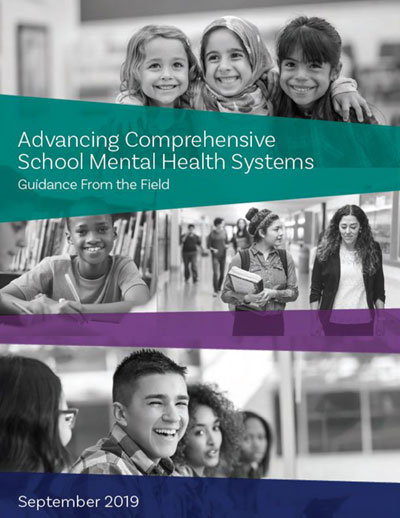Advancing Comprehensive School Mental Health Systems
These resources and other resources have been developed through partnerships with local, state, and national leaders and organizations with support from the Bainum Family Foundation.
Advancing Comprehensive School Mental Health Systems: Guidance from the Field
This resource synthesizes the knowledge and guidance of over 75 experts nationally. Ultimately, this resource is a foundational document in the field to help guide local, state, and national efforts to strengthen school mental health efforts and to start to understand and bring consensus to the quality domains of school mental health. This includes:
- Bainum Family Foundation
- U.S. Department of Health and Human Services
- Human Resources and Services Administration (HRSA)
- Substance Abuse and Mental Health Services Administration (SAMHSA)
- Center for Health and Health Care in Schools at George Washington University
- Child Health and Development Institute of Connecticut
- National Association of State Directors of Special Education
- National Center for School Mental Health (NCSMH)
- School-Based Health Alliance
Download the entire report and supplementary figures below:
Report Figures
Comprehensive School Mental Health (CSMH) System Dialogue Guide Package
This CSMH System Dialogue Guide package is a complementary resource to the foundational document Advancing Comprehensive School Mental Health Systems: Guidance from the Field. It was co-created by over 60 leaders from organizations that are central to the success of local, state, and national efforts to build quality, evidence-based school mental health systems that promote student well-being and provide mental health services and supports. School mental health is a cross system/cross discipline effort. More than a program, Comprehensive School Mental Health requires a system building approach if we are to build the infrastructure and capacity for quality and sustainability. The CSMH System Dialogue Guide package is a valuable resource to bring CSMH Systems into policy and practice. The package includes the following: 1) Guidance document, 2) the eight Dialogue Guides and 3) Resources and 4) Response Strategies. These eight Dialogue Guides focus on the CORE Components of Comprehensive School Mental Health Systems (CSMH). Dialogue Guides are essential tools to engage stakeholders at multiple levels and across disciplines. Meaningful engagement and dialogue is the foundation for building effective school mental health systems that benefit our students and the wider school community. To access this package along with the brand-new Becoming a School Mental Health Champion Facilitation Guide: Hosting Dialogue on Comprehensive Systems of School Mental Health, select the "Download Resources" button above.
We recommend not using the Safari browser to view these resources, as colors may appear inverted. Other browers (Chrome, Edge, FireFox, etc.) should work fine.
Download the Becoming a School Mental Health Champion Facilitation Guide
Download Dialogue Guides Package as Single PDF
Download Each Dialogue Guide Individually by Core Feature
- Introduction: Hosting Dialogue on Comprehensive School Mental Health Systems
- CF 1: Well-Prepared Educators & Specialized Instructional Support Personnel
- CF 2: Family, School and Community Collaboration and Teaming
- CF 3: Needs Assessment and Resource Mapping
- CF 4: Multi-Tiered Systems of Support
- CF 5: Mental Health Screening in Schools
- CF 6: Evidence-Based and Emerging Best Practices
- CF 7: Data
- CF 8: Funding
- Dialogue Guide Response Strategies
State Policy Opportunities: Advancing Comprehensive School Mental Health Systems to Support Students
- Download the report from Healthy Schools Campaign and Mental Health America
- View the press release and blog post on this report from Healthy Schools Campaign and Mental Health America.
Watch the symposia session Advancing Comprehensive School Mental Health Systems Through State Policy and Systems Change below, presented at the 2022 Annual Conference on Advancing School Mental Health.
Report Contributors: Advancing Comprehensive School Mental Health Systems: Guidance from the Field
Federal Departments/Agencies
U.S. Department of Education
Office of Elementary and Secondary Education,
Norris Dickard, Paul Kesner and Kimberly Lights
Office of Special Education and Rehabilitative Services Programs,
Rene Bradley
U.S. Department of Health and Human Services
Office of Intergovernmental and External Affairs/Center for Faith and Opportunity Initiatives,
Ben O’Dell
Office of the Secretary/Office of the Assistant Secretary for Planning and Evaluation,
Joel Dubenitz and Pamala Trivedi
Centers for Disease Control and Prevention,
Holly Hunt and Zanie Leroy
Centers for Medicare and Medicaid Services,
Liz Clark, Karen Matsuoka and Deirdra Stockmann
Health Resources and Services Administration,
Aite Aigbe, Trina Anglin, Alfred Delena, William England, Dawn Levinson, Lorah Ludwig, Carlos Mena and Alex Ross
Substance Abuse and Mental Health Services Administration,
Tanvi Ajmera, Andrea Alexander, Gary Blau, Ingrid Donato, Lora Fleetwood, Larke Huang, Eric Lulow, Joyce Sebian, Elizabeth Sweet, Wendie Veloz, Melodye Watson and Ekaterina Zoubak
U.S. Department of the Interior
Bureau of Indian Education,
Teresia Paul
U.S. Department of Justice
Office of Justice Programs/Office of Juvenile Justice and Delinquency Prevention,
Kathryn Barry and Kathy Mitchell
States
Connecticut Department of Children and Families,
Tim Marshall
District of Columbia Department of Behavioral Health,
Charnetta Scott
Maryland State Department of Education,
Reginald Burke
New Hampshire Department of Education,
Mary Steady
North Carolina Department of Health and Human Services,
Terri Grant
Department of Public Instruction,
Lauren Holahan
Pennsylvania Department of Human Services,
Sherry Peters and Shannon Fagan
Tennessee Department of Education,
Sara Smith
Department of Mental Health and Substance Abuse Services,
Keri Virgo
Vermont Department of Public Health and Mental Health,
Laurin Kasehagen (CDC Epidemiologist assigned to Vermont)
West Virginia Department of Health and Human Resources,
Jackie Payne
Wisconsin Department of Public Instruction,
Monica Wrightman
School Districts/Schools Adams-Friendship Area School District (WI),
Crystal Holmes
Anne Arundel County Public Schools (MD),
Ginny Dolan
Ashland School District (WI),
Greta Blancarte
Baltimore County Public Schools (MD),
Lisa Selby
Chapel Hill-Carrboro City Schools (NC),
Kerry Sherrill
District of Columbia Prep Charter School (DC),
Raymond Weeden
District of Columbia Public Schools (DC),
Deitra Bryant-Mallory
Hennepin County/Minneapolis Public Schools (MN),
Mark Sander
McDowell County Schools (WV),
Perry Blankenship
Methuen Public Schools (MA),
John Crocker
Monument Academy Public Charter School (DC),
Emily Bloomfield
New York Office of School Health,
Scott Bloom
Somerset County Public Schools (MD),
Tracey Cottman
Other Organizations
American Institutes for Research,
Karen Francis, Beth Freeman and Frank Rider
American Public Health Association,
Kelly Nelson
Basset Healthcare Network,
Chris Kjolhede
Breaking the Cycle,
Sadia Coleman
Center for Health and Healthcare in Schools, George Washington University,
Olga Acosta Price, Rachel Sadlon, Linda Sheriff and Eme Udoh
Communities for Just Schools Fund,
Jaime Koppel
Connecticut Association of School Based Health Centers,
Jesse White-Fresé
Dignity in Schools Campaign,
Zakiya Sankara-Jabar
Family-Run Executive Directors Leadership Association,
Jane Walker
Flint Hills Special Education Cooperative,
Allison Anderson-Harder
Management and Training Innovations,
Beth Stroul
Medstar Georgetown,
Jeff Bostic
Midwest PBIS Network,
Kelly Perales
Montgomery County Federation of Families for Children’s Mental Health,
Robyn Horsey
National Association for Rural Mental Health,
Paul Mackie
National Association of School Nurses,
Susan Hoffman
National Association of School Psychologists,
John Kelly
National Association of State Directors of Special Education,
Joanne Cashman and Mariola Rosser
National Association of State Mental Health Program Directors,
Aaron Walker
National Association of State Mental Health Program Directors, Pennsylvania Representative,
Shannon Fagan
National Center for School Mental Health, University of Maryland School of Medicine,
Tiffany Beason, Yourdanos Bekele, Jill Bohnenkamp, Rachel Bolan, Dan Camacho, Elizabeth Connors, Dana Cunningham, Sharon Hoover, Vinetra King, Nancy Lever, Stephanie Moore, Brittany Parham, Kris Scardamalia and Rachel Siegal
National Conference on State Legislatures,
Tahra Johnson and Margaret Wile
National Federation of Families for Children’s Mental Health,
Lynda Gargan
National Governors Association,
Akeiisa Coleman and Sandra Wilkniss
National Rural Health Association,
Lolita Jadotte
Please Pass the Love,
Jennifer Ulie-Wells
RAND Corporation,
Brad Stein
School-Based Health Alliance,
John Schlitt
School Social Work Association of America,
Libby Nealis
Universities
Appalachian State University,
Kurt Michael
Georgetown University Center for Child and Human Development,
Neal Horen
Johns Hopkins Bloomberg School of Public Health,
Catherine Bradshaw
University of Maryland School of Social Work,
Shannon Robshaw
University of South Carolina,
Mark Weist
Foundations
Bainum Family Foundation,
Noel Bravo, Rozita Green and Nisha Sachdev
Related Products:
The NCSMH, in partnership with the Bainum Family Foundation, worked with six strategic partners to support the uptake and advancement of comprehensive school mental health systems. The organizations and their developed products are listed below:



